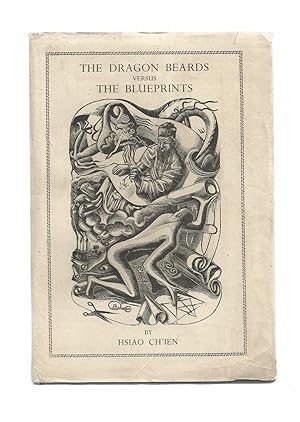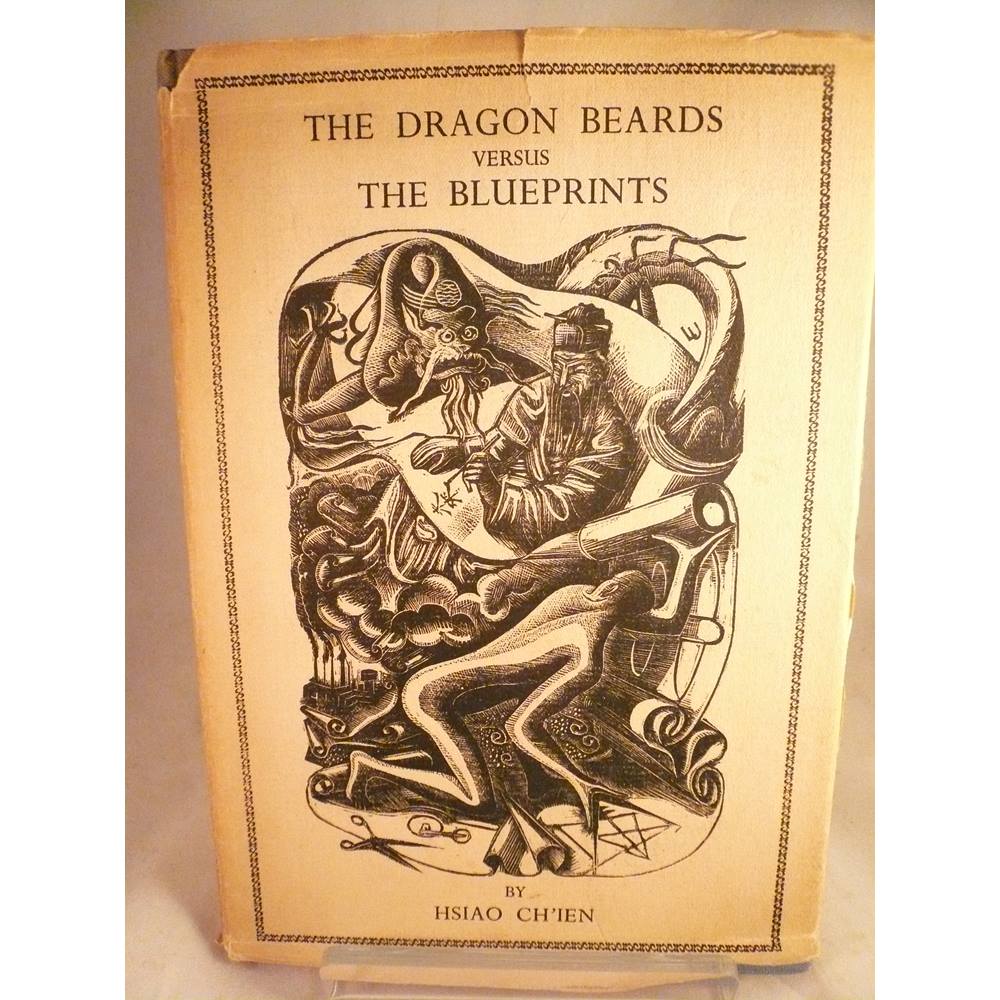2019.07.28
----
2007.11.20
《英國版畫集》. 蕭乾編; 濟南:山東畫報出版社, 2000重印
THE DRAGON BEARDS VERSUS THE BLUEPRINTS
Pilot Press, London 1944. Condition Very Good; spine edged slightly forked. DJ condition Good with small losses on spine and corners; a few tears. Second impression of 1944. Leon Underwood frontispiece in Fine condition. Also front cover by Underwood. Most pages uncut.
- Author(s):
- Hsiao Ch'ien
- Condition:
- Used: very good
- Edition:
- 1st
- Format:
- Hardback
- Publisher:
- Pilot Press
- Title:
- The Dragon Beards versus the Blueprint

View Larger Image
The dragon beards versus the blueprints. (Meditations on post- war culture).
CH'IEN, Hsiao:
Published by The Pilot Press,, 1944
The Dragon Beards Versus the Blueprints: Symposium on Contemporary Chinese Literature Paperback – 1 January 2014by Xiao Qian (Author), Wen Jieruo (Photographer), Fu Guangming (Translator)
Product details
|
蕭乾先生說:“我是一個連圈子都畫不圓的人,然而那並不能阻止我對於繪畫的喜愛。”
他在40年代所選的《英國版畫集》,1947年曾由上海晨光出版公司出版 (HC案:情書中許多人名等專名 由”老闆”趙家壁協助翻譯 ,有些小問題)。“文革”期間,版畫原件亦遭毀壞。蕭乾先生生前即想重版此書。山東畫報出版社根據編者遺願,照原來的版本重印。除了獻辭改為獻給文潔若,繁體字改為簡體字,版權頁照現有情況排印外,版式、紙張、開本均跟原版一樣。這些文潔若在後記(蕭乾周年忌日)中都作了說明。
本書前面約略介紹了英國版畫的淵源與歷史,整本書選了102幅版畫作品,作者、名稱、刻法訊息一併俱全,是很好的參考書籍。《英國版畫集》的獨特魅力……
這些版畫細膩、精緻、極富靈氣,代表了英國特定歷史時期的藝術精神,具有較高的欣賞和收藏價值。
應用:
(王辛笛 {手掌集} 封面--但這隻手的版畫,原作者卻是Gertrude Hermes(裘屈羅·赫密士)女士,該圖題為《花卉》(Flowers)就收在一本我們各自擁有的新版畫冊——蕭乾先生編選的《英國版畫集》中) .
cockerel
Gibbings, Robert (1889-1958), artist, book-designer, and travel writer. Born in Cork, he was educated at UCC and served at Gallipoli. He came under the influence of the artist Eric Gill, running the Golden Cockerel Press from 1924 to 1933. Besides a series of books on rivers including Sweet Thames Run Softly (1940) and Lovely is the Lee (1945), he wrote about the South Seas in Coconut Island (1936).
洛勃脫 蓋平斯
雕刻家 同時是自寫自插圖的著作家 初年是在愛爾蘭過Cork的 在倫敦 Slade和 Central 藝專畢業後 就趕上了第一屆大戰 而且參加了幾乎全軍覆沒的 Gallipoli 一役
曾充英國專出版精本書金雞書店Golden Cockerel Press的編輯 教過書 是英國藝術家到海底寫生的第一人 所著自己的書不下半打 如 椰子島 Coconut Island 馨田甜的泰晤士河溫柔地流著
Sweet Thames Run Softly
這裡引用的木雕是出自他最近的著作
蕭乾編《英國版畫集》 頁111
這段介紹很了不起
我對翻譯要苛責一點
cockerel 是一歲以下的雄雞 我相信中文也有類似的稱呼

The Golden Cockerel Press was founded by Harold M. Taylor in 1920. In 1924, Robert Gibbings joined the press and further developed the aim of making finely produced books available to a wider public at a reasonable price. Eminent artists such as Eric Gill, Osbert Lancaster, Blair Hughes-Stanton and Gibbings were commissioned to illustrate the publications. In 1933, Christopher Sandford, along with Owen Rutter and Francis Newbury, acquired the press. Separate bibliographies of the press's output were issued. Pertelote covers the years 1936 to 1943 and features four books illustrated by JBW.
Robert Gibbings was born in Cork, Ireland. He was educated locally and went on to study medicine for two years at University College, Cork. He later studied art, briefly at the Slade and also at the Central School of Art. He began to experiment with wood engraving, and while on active service in World War I made numerous drawings which he later engraved. After the war he was instrumental in setting up the Society of Wood Engravers. Between 1924 and 1933 Gibbings owned the Golden Cockerel Press at Waltham St Lawrence, near Reading. He directed all aspects of book printing and illustration, decorating many of the publications with wood engravings by himself and other leading artists including Eric Gill. During his time at Waltham he carved a small number of major pieces in stone. The economic slump forced him to sell the press in 1933 and he moved to Cornwall. In 1936 Gibbings became senior lecturer in typography, book production and engraving at Reading University. In 1938 he held a one-man exhibition at Reading Museum titled ‘Twenty Years of Engraving’. His long interest in natural history and his travels resulted in a number of books which he both wrote and illustrated:Sweet Thames Run Softly (1940) was a particular success. In 1955 Gibbings moved from London to Long Wittenham, a village on the banks of the upper Thames. His last book,Till I End My Song, published in 1957, is principally about this village.
Reference: Patience Empson (ed.), The Wood Engravings of Robert Gibbings (1959). Mary A Kirkus, Robert Gibbings: A Bibliography, ed. Patience Empson and John Harris (1962); Andrews, Martin, J. The Life and Work of Robert Gibbings, 2003.
more
http://images.google.com/images?hl=en&q=Gibbings%2C+Robert+&btnG=Search+Images&gbv=2
| Irish Literature Companion. The Concise Oxford Companion to Irish Literature. Copyright © 1996, 2000, 2003 by Oxford University Press. All rights reserved. Read more | ||
| Wikipedia. This article is licensed under the GNU Free Documentation License. It uses material from the Wikipedia article "Robert Gibbings". Read more |
Robert Gibbings (1889-1958) was an artist and author who was most noted for his work as a word carver and for his books on travel and natural history.
Of Irish parentage, he studied at the Slade School of Art and the Central School of Art.
Of Irish parentage, he studied at the Slade School of Art and the Central School of Art.
Works
- Coming Down the Seine
- Sweet Thames Run Softly
- Coming down the Wye
- Till I End My Song
洛勃脫 蓋平斯
雕刻家 同時是自寫自插圖的著作家 初年是在愛爾蘭過Cork的 在倫敦 Slade和 Central 藝專畢業後 就趕上了第一屆大戰 而且參加了幾乎全軍覆沒的 Gallipoli 一役
曾充英國專出版精本書金雞書店Golden Cockerel Press的編輯 教過書 是英國藝術家到海底寫生的第一人 所著自己的書不下半打 如 椰子島 Coconut Island 馨田甜的泰晤士河溫柔地流著
Sweet Thames Run Softly
這裡引用的木雕是出自他最近的著作
蕭乾編《英國版畫集》 頁111
這段介紹很了不起
我對翻譯要苛責一點
cockerel 是一歲以下的雄雞 我相信中文也有類似的稱呼

The Golden Cockerel Press was founded by Harold M. Taylor in 1920. In 1924, Robert Gibbings joined the press and further developed the aim of making finely produced books available to a wider public at a reasonable price. Eminent artists such as Eric Gill, Osbert Lancaster, Blair Hughes-Stanton and Gibbings were commissioned to illustrate the publications. In 1933, Christopher Sandford, along with Owen Rutter and Francis Newbury, acquired the press. Separate bibliographies of the press's output were issued. Pertelote covers the years 1936 to 1943 and features four books illustrated by JBW.
Robert Gibbings (British, 1889-1958)
Robert Gibbings was born in Cork, Ireland. He was educated locally and went on to study medicine for two years at University College, Cork. He later studied art, briefly at the Slade and also at the Central School of Art. He began to experiment with wood engraving, and while on active service in World War I made numerous drawings which he later engraved. After the war he was instrumental in setting up the Society of Wood Engravers. Between 1924 and 1933 Gibbings owned the Golden Cockerel Press at Waltham St Lawrence, near Reading. He directed all aspects of book printing and illustration, decorating many of the publications with wood engravings by himself and other leading artists including Eric Gill. During his time at Waltham he carved a small number of major pieces in stone. The economic slump forced him to sell the press in 1933 and he moved to Cornwall. In 1936 Gibbings became senior lecturer in typography, book production and engraving at Reading University. In 1938 he held a one-man exhibition at Reading Museum titled ‘Twenty Years of Engraving’. His long interest in natural history and his travels resulted in a number of books which he both wrote and illustrated:Sweet Thames Run Softly (1940) was a particular success. In 1955 Gibbings moved from London to Long Wittenham, a village on the banks of the upper Thames. His last book,Till I End My Song, published in 1957, is principally about this village.
Reference: Patience Empson (ed.), The Wood Engravings of Robert Gibbings (1959). Mary A Kirkus, Robert Gibbings: A Bibliography, ed. Patience Empson and John Harris (1962); Andrews, Martin, J. The Life and Work of Robert Gibbings, 2003.
The Mill Wood engraving included in Twelve Wood engravings (privately published, 1921) Wood engraving on paper, signed by the artist 1918 108 x 70mm. References: recorded in Empson, Patience, The Wood-engravings of Robert Gibbings, 1949: 11. £420 A rare and early engraving by Gibbings from 1918. | ||||
St. Pachome, Abbot of Taberne Wood engraving for Beasts and Saints by Helen Waddell (1934) Wood engraving on paper, signed by the artist 1934 120 x 94mm. References: recorded in Empson, Patience, The Wood-engravings of Robert Gibbings, 1949: 140; illustrated in Andrews, Martin, J. The Life and Work of Robert Gibbings, 2003: 185. • A striking wood engraving from 1934 to illustrate Helen Waddell’s book Beasts and Saints which was a collection of stories and folk tales on the theme of ‘the mutual charities between saints and beasts’ dating from the fourth to the twelfth centuries and translated from the Latin by Waddell. Gibbings was particularly satisfied with his work for the book, recalling ‘My engravings in these two books were the best that I had so far accomplished, and gradually the sadness I felt at losing my press was dissipated.’ (Robert Gibbings, Some Recollections, from Patience Empson, The Wood-engravings of Robert Gibbings, 1949: xlii). | ||||
more
http://images.google.com/images?hl=en&q=Gibbings%2C+Robert+&btnG=Search+Images&gbv=2




沒有留言:
張貼留言